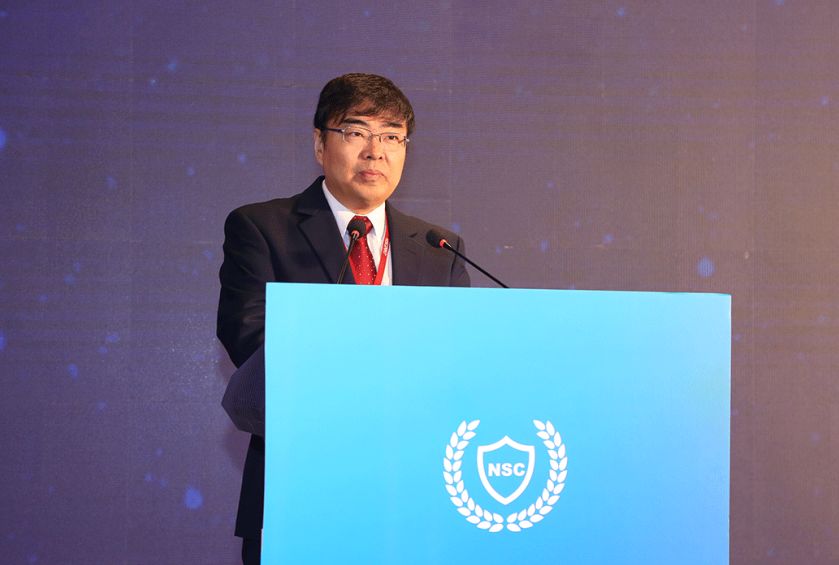Three drafters talk about the first financial blockchain specification: the central bank recognizes the blockchain, and the industry no longer grows savagely
Recently, the central bank issued the financial industry standard "Technical Specifications for Financial Distributed Ledger Security ." This is the first blockchain specification in the domestic and international financial industry.
In response to the launch of this important specification, Interlink Pulse interviewed experts involved in drafting: Professor Chen Zhong of Peking University, Professor Cai Liang of Zhejiang University, and the blockchain technology products of the standard science and technology unit's innovation technology business department of JD.com Zhang Zuoyi, the person in charge of innovation, in order to know the impact of the specification on the blockchain field.

Chen Zhong , a professor and doctoral supervisor at Peking University, a member of the Chinese Computer Society, an executive director, and a deputy chairman of the Committee on Information Privacy, the deputy chairman of the Computer Education Committee of the Ministry of Education, the vice chairman of the China Software Industry Association Vice Chairman of the Open Source Software Advancement Alliance
- Libra welcomes new members, has this company been almost acquired by Coinbase for $ 150 million?
- Bitcoin once fell below $ 8,600, and BitMEX's bitcoin settlement exceeded $ 150 million
- Blockchain applications enter the fast lane: 4 "Blockchain +" scenarios have begun to fight the epidemic

Cai Liang , Deputy Dean of School of Software, Zhejiang University, Executive Deputy Director of Zhejiang University Blockchain Research Center, Executive Deputy Dean of Zhejiang Blockchain Technology Research Institute, Deputy Director of Blockchain Professional Committee of China Computer Society, China Trusted Zone Vice Chairman of Blockchain Alliance

Zhang Zuoyi , Head of Product Innovation, Blockchain Department , JD Innovation and Technology Business Department
Inter-chain pulse: This specification is called "the first blockchain standard in the domestic financial industry." How do you view the impact and significance of this specification on the blockchain field? What kind of development opportunities will the industry bring?
Chen Zhong: As one of the drafters of the specification, I understand that the drafting of this specification has undergone long-term discussions and consultations with many agencies and experts. I believe that the release of this specification will have a positive impact on the development of domestic blockchains, especially in the financial industry. This industry-specific technical specification will play a certain supporting role in the blockchain application in the industry.
Cai Liang: Standards are not necessarily the latest or cutting-edge, but standards must be the consensus of most people. The first blockchain standard in the domestic financial industry is positioned as a security field, which shows that the blockchain characteristics that many practitioners care about and pay attention to are security, while autonomous controllability is exactly the cornerstone of security. I think this standard is a positive signal for the development of blockchain. First of all, this standard requirement represents the central bank's recognition of the application value of blockchain in the financial field. On the other hand, this specification can also promote other industries to regulate blockchain. The importance of formulation has helped the healthy development of our national blockchain industry.
Zhang Zuoyi: The release of this standard by the central bank is a landmark event for the entire industry. Why do you say that? We all know that the emergence of any new technology has a process of small-scale application to large-scale expansion, from non-standard to standardized. The role of the standard in this is to standardize, indicate the direction, and specify the requirements. These requirements were not conceived from the brain, but accumulated through the long-term exploration of the entire industry. They were also summarized and refined by the central bank and other leading departments on the basis of comprehensive experience and technological development of various parties. It can be said that the release of this standard is not only in the district The determination of the leading edge in the development and application of block chain standards is also a new opportunity for practitioners in the domestic financial industry and the block chain industry. "With the same text and the same track", with the standard block chain, there will no longer be only brutal growth. , There will be more consensus and cooperation foundation, which is of great guiding significance for the blockchain to further connect the digital world and achieve interconnection and interconnection with each other.
Interchain Pulse: What impact do you think this standard will have on companies involved in blockchain finance in the current industry?
Chen Zhong: At present, domestic blockchain business applications are being carried out in an orderly manner. At the beginning of 2019, China began to promote the registration and filing of blockchain information services as a standardized management measure for the development of the blockchain industry. The release of "Technical Specifications for Financial Distributed Ledger Technology" has further provided guidance and support in terms of technical standards for enterprises developing blockchain applications in the financial direction, which can be said to fill a gap. It will have a direct impact on the development and application of blockchain companies in this field in the future, as well as the development of blockchain pilot demonstration services by financial institutions.
At the end of 2019, the People's Bank of China launched a pilot project for fintech innovation supervision, actively built a basic fintech supervision system, explored the use of flexible management methods such as information disclosure, product disclosure, and social supervision, and worked hard to create an inclusive and prudent fintech innovation supervision tool. Improve the professionalism, uniformity and penetration of financial supervision. The introduction of the standard of "Financial Distributed Ledger Technical Security Specification" is also an important starting point, which also has a positive supporting role in the pilot demonstration projects of fintech innovation supervision.
Cai Liang: The standard puts forward security requirements for the application of blockchain technology in the financial industry. On the one hand, the application of blockchain in the financial industry will be more standardized, and more attention will be paid to the security and reliability of blockchain technology. On the one hand, due to the specifications in the security field, it will be beneficial to the implementation of blockchain-based financial infrastructure, especially in application areas such as cross-border payment settlement and asset securitization (ABS).
Zhang Zuoyi: As one of the standard participating units, JD.COM has participated in the writing of this standard under the guidance of the central bank. It can be said that during the standard formulation process, we fully referenced and borrowed the requirements of the standard and developed our own blockchain. The design and transformation of financial business, meanwhile, like many participating units, contribute our own experience and thinking in the construction of blockchain to this standard.
Inter-chain pulse: Will the standard promote the development of digital currency, and how will it affect various financial institutions in the operation of digital currency?
Chen Zhong: I think "distributed ledger technology" is a more standardized term for "blockchain" in the financial field. The article "Development and Management of Blockchain Technology" previously released by the Blockchain Research Group of the Digital Currency Research Institute of the People's Bank of China also pointed out that blockchain is a new type of distributed database, also known as a distributed ledger. The distributed ledger technology does not only correspond to the application of digital currency. It is a low-level technology that will support various types of applications in various industries. "Financial Distributed Ledger Technical Security Specification" proposes a general security specification for distributed ledger technology. As an industry standard, its applicability is relatively broad. It will be the bottom layer of business applications in the financial field including digital currency and supply chain finance Safety plays a regulatory role.
Cai Liang: The development of digital currency is affected by many fields such as monetary finance, computer science, and economics. The issuance and implementation of this standard helps financial institutions to deploy and maintain systems in accordance with appropriate security requirements, avoiding security shortcomings, providing business assurance capabilities and information security risk constraint capabilities for large-scale application of distributed ledger technology, and industrial application. Form a benign promotion. Starting from the blockchain technology itself, since the blockchain technology is an excellent infrastructure for carrying digital currencies, financial institutions such as banks are bound to increase their research and application of blockchain technology.
Zhang Zuoyi: China has only one legal digital currency, that is, the DCEP being promoted by the central bank. DCEP can be simply understood as the digital currency version of RMB. With the introduction of this standard, we believe that the implementation of DCEP will be more favorable and smoother. It is for financial institutions in the digital currency operation link to be able to build a blockchain network in accordance with unified standards and specifications to ensure the realization of the financial-grade security effect of the blockchain. The standard actually laid a good foundation for the successful implementation and large-scale use of DCEP. It is a very forward-looking and important implementation measure.
Inter-chain pulse: Most of the current blockchain standards are technical standards. How will they be implemented in blockchain products in the future?
Chen Zhong: Products and technologies in FinTech are closely linked. As a technical standard, they will play a positive role in promoting the implementation of blockchain products. However, there will also be non-technical factors in the application of blockchain, which need to be promoted through management measures such as laws, regulations, rules and regulations, and industry regulations.
In addition, relying on a current standard alone cannot fully support the implementation of blockchain products. In the future, more industry collaborations and series of standards and specifications will be needed to further promote the application of the industry. It is hoped that the pace of standard formulation in this regard will be faster and further integrated with the actual needs of the industry.
Cai Liang: Standards guide the development of products. At the same time, blockchain products will also affect the iteration of standards. Essentially, products and standards affect each other. Based on the application products derived from the blockchain, practitioners need to consider designing products that are more close to current user habits and experiences based on technical standards, and gradually form the specifications of blockchain products.
Zhang Zuoyi: Technical standards are the foundation. Maybe everyone feels that the technology is very large and far away from us. In fact, the technology is with us. First, we must lay the foundation through the technical standards. Setting up and running steadily is an inevitable law for the objective development of things. After the foundation is laid, the next important issue for blockchain products is to connect the existing digital world, and the digitization of the existing world itself is a gradual and progressive process by industry and field. In this process, Blockchain must combine its own technical characteristics with the pain points of governance and synergy in the digital world, truly play the role of blockchain technology, solve practical problems, reduce costs, increase efficiency, improve user experience, assist supervision and collaboration, and achieve Continuous value is a very important task for blockchain products.
We will continue to update Blocking; if you have any questions or suggestions, please contact us!
Was this article helpful?
93 out of 132 found this helpful
Related articles
- Viewpoint | Professor of Beijing Jiaotong University: Blockchain talent reserve is extremely insufficient
- Blockchain has been shortlisted in 22 provinces, autonomous regions, and municipalities. This year's government report. Industry opportunities?
- Many mainstream project development funds are facing "burnout". Should BCH levy a miner tax?
- Anchor Coin Watch: Can Bitcoin on Ethereum Break the DeFi Ceiling?
- Demystifying the IOTA mainnet suspension, bZx and SIM being hacked, doing so can improve account security
- Sue against FB, buy spaceship tickets with BTC, bitcoin career of billionaire "Gemini" brothers
- Front Running: The Achilles heel of decentralized trading





